In November 2018, MCH Group pulled its investment out of Art SG, just months after the launch of the Singapore fair had been announced.
Fast forward just over three years and Art SG has still yet to run (having been delayed multiple times since it was first meant to happen in 2019), but MCH has had a change of heart.
Today, the Swiss company announces that it has bought a 15% minority stake in Art Events Singapore, the organiser of Art SG, which is due to run, finally, for the first time from 12 to 15 January 2023 at the Marina Bay Sands Expo and Convention Centre. (Both parties declined to reveal the amount of the deal).
So why the volte-face?
Back in 2018, it was a “strategic decision” by MCH to “stop the development of a portfolio of regional art fairs,” says the firm’s head of corporate communications, Christian Jecker (the company sold its stakes in the India Art Fair and Art Düsseldorf at the same time). “In the meantime, a lot has changed at MCH,” Jecker continues, “Reinforcing the position of Art Basel in Hong Kong, and contributing to the long-term strength of the art scenes in Asia, is one of the strategic pillars. The participation in ART SG is a unique opportunity, specifically oriented towards strengthening the art market and MCH Group's presence in the Asian region.”
“MCH’s investment in Art SG is part of our strategy to support the regional art market and the gallery scene across Asia," Jecker says. "With its compelling proposition receiving strong support from regional and international galleries, ART SG is ideally positioned to foster the development of this regional art market.”
Investing in an event that has never happened before is a risk, but “no one can predict the future” Jecker says. "Art SG is optimistic that the pandemic situation will allow for a safe and successful staging by 2023.”
Art SG already has commitment from 85 international galleries who have signed up to the fair next year, including Victoria Miro, White Cube, Gagosian, Xavier Hufkens, Pace and Sadie Coles, and Renfrew expects “over 100 exhibitors”.
Art fair consultant Magnus Renfrew took up MCH's stake in Art SG when it pulled out last time and co-founded Art Events Singapore with Sandy Angus and Tim Etchells. In 2008 Angus and Etchells launched Art HK and later sold to to MCH who relaunched it as Art Basel in Hong Kong, with Renfrew as fair director. Angus also launched the India Art Fair in 2011 before selling a 65% stake to MCH in 2016—then buying it back in 2019 after MCH sold out.
“We're on very good terms with MCH,” Renfrew says. “I was director of Art Basel Hong Kong for the first couple of years, and Sandy Angus has a very long-standing relationship with MCH, even prior to the Art HK acquisition, and we knew about their interest in trying to expand within Asia. So we reached out to MCH Group and they were very responsive.” He adds: “It's a minority stake so MCH is not going to be taking on operational roles and responsibilities but, nonetheless, it's great to be working with people that share our vision that Southeast Asia is a serious market that deserves to be recognised and engaged with.” MCH will be involved at board level, Renfrew says, providing support through offering up its network and contacts.
A move away from Hong Kong?
Such a move by MCH will inevitably raise questions about whether the company is eyeing up an alternative Asian hub to Hong Kong, as Beijing strengthens its grip on the special administrative region with the introduction of the National Security Law last year and a widespread crackdown on freedom of speech.
Adeline Ooi, Art Basel’s Asia director, bats away the suggestion that the Art SG stake could be read as the company backing away from the city: “Hong Kong is firmly the home of the Art Basel show in Asia. MCH's investment in Art SG is aligned with our strategy to support the regional art markets across Asia, and our galleries and the ecosystems that sustain them, which we see as complementary to the core business of running our show in Hong Kong.”
Renfrew, too, shies away from pitting Hong Kong against Singapore: “My approach has always been not to think in terms of the advantage of one place over another—it's really important to set apart the offering that you're trying to make positively rather than negatively.” Singapore, he says, “is the natural hub for Southeast Asia, which is home to many of the fastest growing economies in the world and has a population of around 500m—not far off the population of Europe. So, logic dictates that it deserves at least one international level art fair.”
This is an “extraordinary time” for Singapore, Renfrew says, particularly in terms of the private wealth management boom: “The number of family offices in Singapore has doubled in the last 18 months from 200 to 400…a lot of people from Indonesia have based themselves here during the pandemic, due to the health measures in place, and many have since made it their permanent base.” The art scene has a “real sense of energy”, he adds, with the lively gallery districts of Gillman Barracks and, more recently, Tanjong Pagar.
Renfrew adds: “If you think about how the discourse has changed over the last five or six years from Asia-Pacific to Indo-Pacific, whereas one might find it a step too far to claim that Singapore was the capital of the Asia-Pacific, I think that it can quite comfortably make claim to being capital of the Indo-Pacific.”





